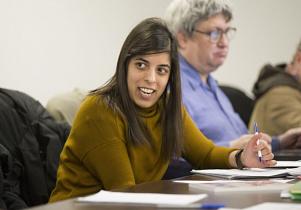Tapping into the transformative power of writing
Severe depression and other mental health challenges robbed Roberta Taylor’s creativity and zest for life.
But free creative writing workshops offered to people from some of the city’s most marginalized communities have helped the Toronto woman find her voice.
“It has changed my life,” says Taylor, 57, who moved into her own apartment in January after living in supportive housing for seven years.
“It has made me much more mentally stable,” she says. “And it has helped me stand up and reclaim my creativity.”
Founded in 2012 by Susan Turk Mozer, the Toronto Writers Collective has trained more than 80 volunteer facilitators who run workshops for people from Indigenous and LGBTQ communities, the homeless, youth at risk, abused women, those with mental illness and people in conflict with the law.
“By writing and sharing stories in a safe and supportive environment, people heal themselves,” says the collective’s part-time program manager Jesse Cohoon.
As the only paid staff member in the largely voluntary-run program, Cohoon co-ordinates more than a dozen weekly workshops of between eight and 12 participants in shelters, community centres and libraries across the city.
“It is really a calling and a passion for everyone involved,” he notes.
New research being released next weekend quantifies the impact of the workshops and shows the benefits for writers and facilitators, says Ryerson University Associate Professor Kelly McShane, a clinical psychologist and credentialed evaluator.
“We saw significant changes across the 10-week program for both groups,” says McShane, who conducted the research with funding from the Ontario Trillium Foundation. “It provides convincing evidence of the magic of the writing workshops.”
She believes it is the first Canadian study to measure the benefits of a no-barrier, community-based creative writing program for people from marginalized groups.
Of 46 participants surveyed in the research, 30 are living with addiction or in recovery from addiction, 26 have mental health challenges, 19 are survivors of violence, 11 are newcomers, three are caregivers and two are youth.
Nine of the 15 facilitators interviewed for the study began as workshop participants and enjoyed the experience so much, they took training to become leaders.
“This is an important statistic because it shows people are passionate about the work and are feeling a sense of pride and a sense of confidence to be interested and willing to become facilitators,” McShane says.
When asked to rate how much they had changed as a result of the program, writers reported major improvements in their feelings of hope, well-being, resilience, empowerment and connectedness. They also noted positive changes in their self expression, creativity and writing skills, McShane says.
McShane has obtained matching federal funds to continue the research until June and hopes her findings help the collective secure more stable funding so the program can expand beyond Toronto into other GTA communities and eventually across Canada.
“We know people want an evidence-based approach to funding,” adds McShane, who will be presenting her interim findings at the Michaëlle Jean Foundation’s Power of the Arts Conference in Montreal on Saturday.
At a recent workshop at Progress Place, a downtown community hub for people living with mental illness, the writing begins with a participant reading a poem as a prompt.
The reading elicits tales of recovery, a dog’s life, travel and love.
Taylor reads what she has written to appreciative comments from the group that highlight her poem’s sense of longing and subtle humour.
The beauty of the process is that everyone, even the facilitator, writes and is invited to read what they have written to the group, notes facilitator Aysha Teja, 33.
Group members are invited to comment, but permitted to offer only observations about what is strong or memorable about the piece. The effect creates a space of caring and support that is reflected on the faces of the writers, Teja notes.
“When you see them smile when you’ve said something about their piece, you see it very visibly . . . the joy that comes from being seen,” she says.
“As much as it’s about the writing, it’s much more than that. It’s about being seen and affirmed.”
Teja, who heard about the workshops online, began facilitating at Progress Place last fall as part of McShane’s research. She is excited by how the writers “have really gelled as a group” and have continued to meet beyond the initial 10-weeks, as have many other workshops.
“They are like a little family that supports each other. They are gentle with each other. They treat each other with such care and respect,” she says.
The group’s co-facilitator Ken Rosser, 59, who has experienced mental health challenges himself, says the workshops have provided important feedback for his writing.
Diagnosed as an adult with Autism Spectrum Disorder, a developmental disability characterized by challenges with social and communication skills, Rosser says facilitating has helped him overcome depression and feelings of low self-worth.
“Writing with others has made me more confident,” he says. “It has given me a purpose.”
Roberta Taylor's poem
I am living in this doggy life
drowning in woes and strife.
And yet I am happy with my bowl of stew
that I share with you.
I am dying in this doggy life.
I have failed and flourished and failed some more
Just to grow wiser, older, more obsolete
Like black and white TVs
or alarm clocks not attached to cellphones.
. . .
From a distance, I fear and love dogs
And from a distance, I fear and love life.
Maybe I will have a dog someday
And learn to play
And have doggy dreams.
But for now I don’t have pets. Not even a Chia.
I wish I could bay at the moon
Because this doggy life ends all too soon.
Comments
There are 0 comments on this post





